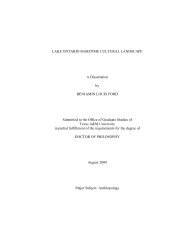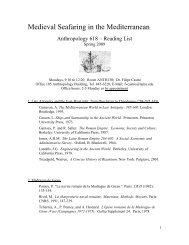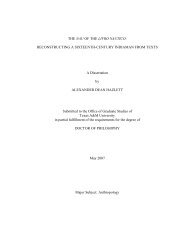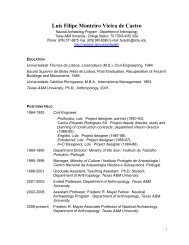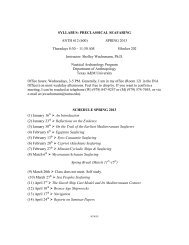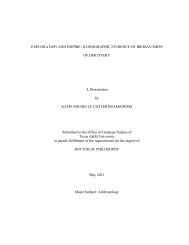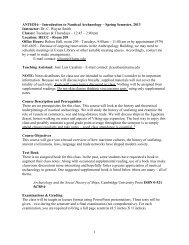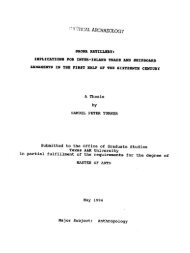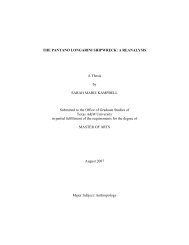Download Pdf of Dissertation - Nautical Archaeology at Texas A&M ...
Download Pdf of Dissertation - Nautical Archaeology at Texas A&M ...
Download Pdf of Dissertation - Nautical Archaeology at Texas A&M ...
You also want an ePaper? Increase the reach of your titles
YUMPU automatically turns print PDFs into web optimized ePapers that Google loves.
Circus Maximus, the other in the Campus Martius, as for this one recently brought in,<br />
he neither ventured to meddle with it not move it, overawed by the difficulties caused<br />
by its size –let me inform those who do not know it th<strong>at</strong> th<strong>at</strong> early emperor, after<br />
bringing over several obelisks, passed this one and left it untouched because it was<br />
consecr<strong>at</strong>ed as a special gift to the Sun God, and because being placed in the sacred<br />
part <strong>of</strong> his sumptuous temple, which might not be pr<strong>of</strong>aned, there it towered al<strong>of</strong>t like<br />
the peak <strong>of</strong> the world. 13. But Constantine, making little account <strong>of</strong> th<strong>at</strong>, tore the huge<br />
mass from its found<strong>at</strong>ions; and since he rightly thought th<strong>at</strong> he was committing no<br />
sacrilege if he took this marvel from one temple and consecr<strong>at</strong>ed it <strong>at</strong> Rome, th<strong>at</strong> is to<br />
say, in the temple <strong>of</strong> the whole world, he let it lie for a long time, while the things<br />
necessary for its transfer were being provided. And when it had been conveyed down<br />
the channel <strong>of</strong> the Nile and landed <strong>at</strong> Alexandria, a ship <strong>of</strong> a size hitherto unknown was<br />
constructed, to be rowed by three hundred oarsmen. 14. After these provisions, the<br />
aforesaid emperor departed this life and the urgency <strong>of</strong> the enterprise waned, but <strong>at</strong> last<br />
the obelisk was loaded on the ship, after long delay, and brought over the sea and up<br />
the channel <strong>of</strong> the Tiber, which seemed to fear th<strong>at</strong> it could hardly forward over the<br />
difficulties <strong>of</strong> its outward course to the walls <strong>of</strong> its foster-child the gift which the<br />
almost unknown Nile had sent. But it was brought to the vicus Alexandri distant three<br />
miles from the city. There it was put on cradles and carefully drawn through the Ostian<br />
G<strong>at</strong>e and by the Piscina Publica and brought into the Circus Maximus. (J. C. Rolfe).<br />
305<br />
App. B. Civ. 5.14.133:<br />
Pomphvio~ d j ejk me;n Sikeliva~ a[kra/ Lakiniva/ prosevce kai; to; ijero;n th`~ {Hra~<br />
ploutou`n ajnaqhvmasin ejsulhse, feuvgwn ej~ ∆Antwvnion.<br />
Pompeius, fleeing from Sicily to Antony, stopped <strong>at</strong> the Lacinium promontory and<br />
robbed the rich temple <strong>of</strong> Juno <strong>of</strong> its gifts. (H. White).<br />
App. Sam. 7.1:<br />
{Oti Kornhvlio~ ejpi; k<strong>at</strong>afravktwn devka new`n ejqea`to th;n megavlhn JEllavda,<br />
kaiv ti~ ejn Tavranti dhmagwgo;~ Filovcari~, aijscrw`~ te bebiwkw;~ kai; para;<br />
tou`to kalouvmeno~ Qaiv~, palaiw`n tou;~ Tarantivnou~ ajnemivmnhske sunqhkw`n,<br />
mh; plei`n JRwmaivou~ provsw Lakiniva~ a{kra~, paroxuvna~ te e{peisen ejpanacqh`nai<br />
tw/` Kornhlivw/. kai; tevssara~ me;n aujtou` nau`~ k<strong>at</strong>evdusan oiJ Taranti`noi,<br />
mivan de; e{labon aujtoi`~ ajndravsin. e{~ te Qourivou~ ejgklhvm<strong>at</strong>a poiouvmenoi o{ti<br />
{Ellhne~ o{nte~ ejpi; JRwmaivou~ k<strong>at</strong>evfugon ajnti; sgw`n, kai; parelqei`n aujtouv~<br />
ejpevkeina ai[tioi mavlista ejgegevnhnto, tou;~ me;n ejpifanei`~ aujtw`n ejxevbalon,th;n<br />
de; povlin dihvrpasan, kai; tou;~ ÔRwmaivwn frourou;~ uJpospovndou~ ajfh`kan.<br />
Conelius went on a voyage <strong>of</strong> inspection along the coast <strong>of</strong> Magna Graecia with ten<br />
decked ships. At Tarentum there was a demagogue named Philocharis, a man <strong>of</strong> obscene<br />
life, who was for th<strong>at</strong> reason nicknamed Thais. He reminded the Tarentines <strong>of</strong> an old tre<strong>at</strong>y<br />
by which the Romans had bound themselves not to sail beyond the promontory <strong>of</strong><br />
Lacinium, and so stirred their passion th<strong>at</strong> he persuaded them to put to sea and <strong>at</strong>tack<br />
Cornelius, <strong>of</strong> whose ships they sank four and captured one with all on board. They also<br />
accused the Thurini <strong>of</strong> preferring the Romans to the Tarentines although they were Greeks,



